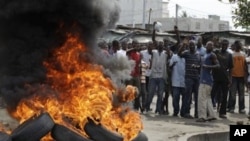Deadlock continues in the West African nation of Cote d'Ivoire, as former President Laurent Gbagbo clings to power, despite his increased international isolation following his defeat in the November 28 run-off election.
Regional leaders met in Nigeria December 7 to discuss the political crisis, reaffirming the election results, determined credible and transparent by international observers, that declared former prime minister Alassane Ouattara the rightful winner and calling on Gbagbo to yield power.
The UN Security Council also endorsed this outcome. Given the nation's recent troubled history, it is feared that the situation could escalate into violence, threatening the stability of the entire region.
The government has had a power sharing agreement since 2003, and the peace agreement that sought to end a civil conflict there envisioned this election as a way to unify Cote d'Ivoire under a democratically elected leader. The situation was further complicated when the Constitutional Court, without factual basis, disqualified hundreds of thousands of votes from Ouattara's electoral base in the country's north, sanctioning Gbagbo's recalcitrance.
The United States calls on all parties to respect the results of the November 28 election declaring Ouattara the winner. No party should be allowed to further obstruct the electoral process, either through violence or posturing. For all parties and the people of Cote d'Ivoire, there is too much at stake for further turmoil.
After a decade of waiting and with strong U.S. support, the country has an opportunity to move forward along a democratic path. Responsibility for allowing the democratic process to unfold peacefully and openly falls squarely on the shoulders of Cote d'Ivoire's leaders.
A Dangerous Standoff In Cote d'Ivoire

Deadlock continues in the West African nation of Cote d'Ivoire, as former President Laurent Gbagbo clings to power, despite his increased international isolation following his defeat in the November 28 run-off election.



